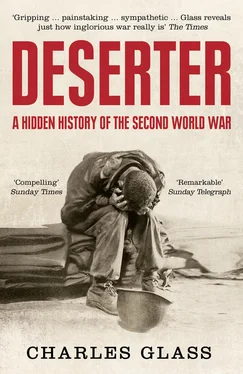Steve and Helen grew up in a redbrick apartment at 275 Ocean Avenue in Brooklyn, opposite Prospect Park. ‘The neighborhood was calm and leafy,’ Steve Weiss remembered years later. ‘The inhabitants were hard-working and white middle class. Most of us were Dodger fans.’ Many, like the Weisses, had moved from tenements in Manhattan’s lower east side. William Weiss was an aloof and undemonstrative father. Every Armistice Day, he would lock himself away from the family and stay alone in his room for an hour or so. ‘I didn’t know who he was,’ Steve Weiss said. William worked at a succession of odd jobs, usually as a watchman. His unreliability created tension between father and son. ‘My father would not pay the electricity bill,’ he recalled. ‘He would gamble with the money.’ Yet Steve had good memories of the old man. ‘He was very entertaining, a good story teller. He never grew up.’ When the Depression hit, William Weiss advised other veterans on ways to obtain pensions and benefits from their years of military service. He even won some money for himself, which the family used to take its first summer vacation away from home, in Poughkeepsie.
In June 1942, six months after the Japanese assault on Pearl Harbor brought the United States into the Second World War, Steve graduated from Lafayette High School in Brooklyn. He was sixteen, two years younger than most of his classmates. Tall for his generation at five foot eleven inches, he weighed a healthy 160 pounds and had a full head of curly auburn hair. He continued his education at night, taking college-level courses in psychology, pathology and chemistry. During the day, the government’s new Office of War Information (OWI) at 221 West 57th Street in Manhattan employed him as a photolithographer. His task was to make plates from photographs to print OWI propaganda periodicals and posters. Steve Weiss wanted to do more by serving overseas in the army’s Psychological Warfare Branch, whose objective in Europe was the same as the OWI’s at home: to engender public support for the Allied cause.
The only way into Psychological Warfare was to enlist in the United States Army. Aged 17, Steve needed his father’s permission. He brought the enlistment papers home, but William Weiss refused to sign. The older man stared at his son ‘with a combination of shock and regret,’ before telling the boy, ‘Real war isn’t like the movies.’ Steve’s Psychological Warfare aspirations were fading. If he waited until his eighteenth birthday in October, the Selective Service Board would draft him. Draftees without college degrees had a good chance of ending up as infantry riflemen, probably the most dangerous and thankless job in the armed forces.
Steve pleaded with his father, who remained impassive. ‘Seems like yesterday,’ William explained to him for the first time, ‘but in the spring of 1918, I was wounded and gassed near Fismes and those experiences still tick over in my head. I’ve spent most of my life trying to recover, starting with four months in a French hospital near Tours and at least two years recuperating out West.’ William Weiss then revealed the secret he had kept since he left Texas: ‘I accidentally shot a man on the streets of El Paso working as a federal narcotics agent. Did you know that? Since then, I’ve never had any energy left for ambition. Too scared to try.’ Seventeen-year-old Steve could only stammer, ‘Dad, I …’
‘Forget about the flags, the bands and the parades,’ his father said. ‘That’s seduction! To increase enlistments. War’s about killing, terrible suffering and broken spirit.’
‘Are you trying to frighten me?’ Steve asked.
‘No,’ his father said. ‘I’m just asking you not to make any sudden moves. If the army needs you, it will find you soon enough.’ When the youngster wouldn’t listen, William appealed to his conscience. ‘Look at all your mother and I have done for you. Even during the Depression, you and your sister never went without. I worked at odd jobs, and your mother worked at Macy’s day in, day out, as a salesgirl doing everything to keep the family together. On a shoestring! Doesn’t that mean something?’
‘Dad,’ Steve said, ‘if you don’t sign the papers, I’ll forge your name and run away.’ Reluctantly, William Weiss signed his teenage son over to the care of the United States Army.
But for the foolish and the heroic who ignore all physical limitations, nature may have to provide these peculiar forms of escape from pain or emotion too strong to endure.
Psychology for the Fighting Man , p. 320
PRIVATE JOHN VERNON BAIN deserted from the British Army in Scotland long before the British Army sent him into combat. He was no coward. The nineteen-year-old volunteer’s record in the boxing ring – finalist at age fourteen in the Schoolboy Championships of Great Britain, Northwest Divisional Junior Champion, Scottish Command Middle Weight Champion in 1941, gold medals and press acclaim – proved as much. Yet, in 1941, he had run away for three weeks from his regimental base at Fort George, which to him was ‘that dark and grey promontory that lay in the Moray Firth like a fossilized Leviathan.’ At the time, he was a corporal in the 70th Battalion of the Argyll and Sutherland Highland Regiment. Deserting from relatively easy duty in Scotland as PTI, physical training instructor, made little sense, and his rationale was vague even forty-six years later: ‘I was supposed to be a corporal, and I was no good at this. I had no idea how to conduct drills and mount guard and all that kind of thing. In a kind of disgust or something, I just sort of cleared off. I wasn’t away long, about three weeks.’
Rather than court martial him for desertion, Bain’s commanding officer demoted him to private. ‘If you did revert to the ranks and had been an NCO,’ Bain said, ‘you could then claim for a transfer. And I was transferred to the London Scottish, and they were a sister regiment of the Gordons. And that was how I was sent to the Gordon Highlanders.’ His new unit was the 5/7th Gordons, a union of the old 5th and 7th Battalions of the distinguished regiment that the Duke of Gordon had established in 1794. Its commanding officer was Lieutenant Colonel H. W. B. Saunders.
Bain had first volunteered in early 1940 to become a pilot in the Royal Air Force, despite his admission that he was ‘singularly ignorant of the political realities’. He knew nothing about the Nazis, the German annexation of Austria or Hitler’s ambition to conquer most of Europe. A physical examination turned up colour-blindness and one punch-damaged eye that disqualified him from flying, so he and his older brother, Kenneth, decided to become merchant mariners. Neither of the Bain brothers, having grown up in the inland Buckinghamshire town of Aylesbury, was an Able Bodied Seaman or had any shipboard experience. Their attempts to sign on before Christmas 1940 at the docks in London, Cardiff and, finally, Glasgow were met with derision. Staying in a rented room that was reducing the meagre hoard of cash they had brought from home, John and Kenneth chanced on a poster: ‘Are you over 18 and under 20? If you are you can join a young soldiers’ battalion.’
John asked his brother, ‘What about that? At least I’d get some shoes without holes.’ Kenneth corrected him, ‘Boots.’ He added the sticking point that, at two years older than John, he was over twenty.
They had a notion that twin brothers could not be separated. ‘The recruiting officer did not show the least disbelief when we gave the same date of birth,’ John wrote. ‘We were medically examined and passed as A1.’ The Army sent them to the 70th Battalion of the Argyll and Sutherlands at the Bay Hotel outside Glasgow. ‘The Army was one service I had sworn I would never join,’ Bain wrote, ‘but, I told myself, a Scottish regiment would be different, more glamorous.’ The glamour of the regimental kilt, stylish headgear and bagpipes gave way to recruit training that was disappointingly unglamorous. ‘The object is to turn one into a kind of automaton,’ he said. ‘It works in a way.’
Читать дальше












